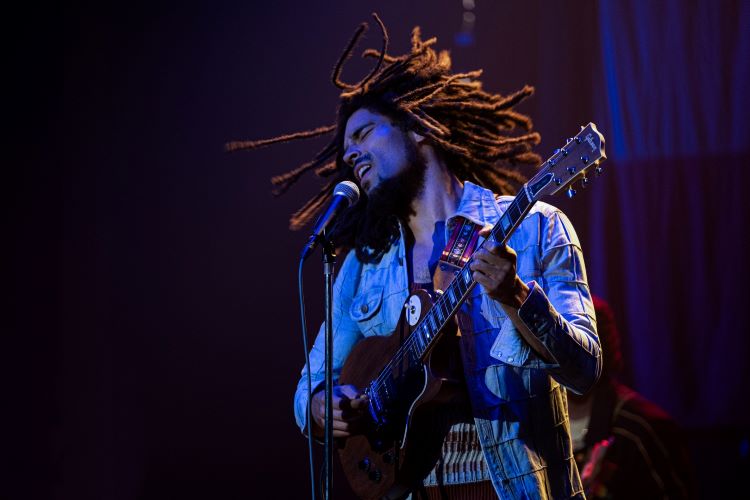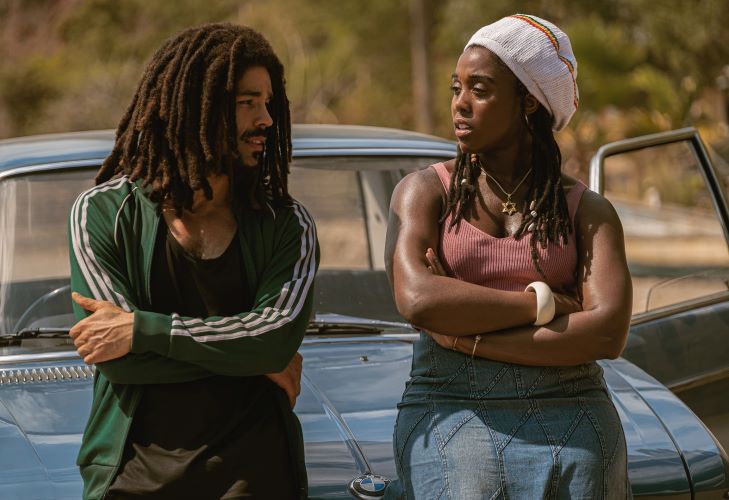
Bob Marley: One Love is a moving tribute to a musician whose music and philosophy of life made an enduring impact on the music scene and popular culture. At one point in the film Marley (Kingsley Ben- Adir) tells a studio executive “music and message same ting, cannot separate” – and that is the feeling the film conveys. Directed by Reinaldo Marcus Green (King Richard), the film was made not only with the approval of Marley’s family, whose wife Rita and two of his children – Cedella and Ziggy – were among its producers, but with their active involvement. Ben-Adir portrays Marley with a radiant authenticity, enhanced by the decision to have the actors speak in Jamaican patois, watching the film one almost feels that he is Marley, especially in the concert scenes, as he is one with the music, his body a vessel, the music a spiritual storm moving through it.
Rather than take a chronological approach, reviewing the events of Marley’s life in order, the film focuses on the period between 1976 – 1978, framing the narrative with two significant concerts that highlight Marley’s vision of unity at a time of political unrest in Jamaica. The country had been under British colonial rule since 1665, achieving independence in 1962. Just over a decade into the post-colonial period there was intense rivalry between the two leading political parties, the JLP (Jamaica Labour party) headed by Edward Seaga, and the PNP (People’s National party) headed by Michael Manley, which led to unrest and violence. As the film opens, Marley is preparing to perform at the Smile Jamaica concert, and event that he viewed as non-partisan, and hoped would foster peace and unity. Yet there were those who thought the concert was in support of Manley, and the atmosphere was tense. Two days before the concert, gunmen broke into Marley’s home, shooting Marley, his wife Rita (Lashana Lynch), and his manager Don Taylor (Anthony Welsh). Marley emerges without serious injury and performs at the concert, but it is no surprise that his next move is to leave Jamaica for a sojourn in London.

As the film follows Marley during those two years, occasional flashbacks illuminate significant moments and chapters in his youth, and a recurring vision suggests the turbulent feelings beneath Marley’s peaceful demeanor. An image of Marley emerges as a man both intensely physical and spiritual. He’s shown running and playing soccer with his crew, immersed in a waterfall, as he is immersed in his music. Marley is seen in sharp focus, illuminated by Ben-Adir’s charismatic performance, yet those around him remain for the most part blurry figures who are barely individuated. The exception is Lashana Lynch (The Woman King), who delivers a powerful portrayal of Rita. Lynch is an actor with a strong presence and a nuanced, sensitive performance, communicating volumes through her gaze alone. Although not fully elaborated in the film, there is the sense that Marley and Rita had a close and complex relationship that was also a musical collaboration. There were periods of geographic separation between them, and they each had children from other partners in addition to the three children they had together. Rita emerges in the film as a perceptive, intelligent, woman who cares deeply for Marley, supporting him and his vision, yet never compromises her truth, beliefs, and values.
There’s a lot going on in the film, musically as Marley searches for a “new sound” and in the tangles of Jamaican politics. Yet somehow, despite focusing closely on a relatively narrow time interval, it feels as though neither direction is pursued with depth and clarity. The political aspect was confusing for me, watching the film I couldn’t understand why Marley’s performance at the 1976 Smile Jamaica concert was so problematic, while returning to Jamaica from London to perform at the One Love Peace Concert in 1978 was the unifying love-fest Marley hoped it would be. I also felt that there was a missed opportunity here to tell more of the reggae story and show the way that Marley developed his signature sound. Marley’s songs are present throughout, interwoven with the events depicted in the film, flashbacks to Marley’s youth, and suggesting insight to Marley’s thoughts and feelings. The concert scenes are exciting and uplifting, Ben-Adir embodies Marley’s ability to inspire a crowd to rapture. The music is everywhere, and ultimately, the music is perhaps the key to understanding Marley the man, the music and the message are the same.
Bob Marley: One Love
Director: Reinaldo Marcus Green; Screenplay: Terence Winter, Frank E. Flowers, Zach Baylin, Reinaldo Marcus Green; Cinematography: Robert Elswit; Editor: Pamela Martin; Music: Kris Bowers, Bob Marley; Cast: Kingsley Ben-Adir, Lashana Lynch, James Norton, Tosin Cole, Umi Myers, Anthony Welsh, Nia Ashi, Aston Barrett Jr.; Anna-Sharé Blake; Gawaine “J-Summa” Campbell; Naomi Cowan; Alexx A-Game; Michael Gandolfini





